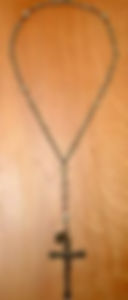The Rosary
- musee17
- Jul 29, 2022
- 2 min read

In the Acadian language, people use the word “chapelet” (French) rather than “rosary” to indicate the series of Hail Marys that a person recites using their chaplet. These words are quite synonymous except that the exact meaning of the word rosary is “large chaplet,” fifteen decades or three chaplets in its ordinary meaning.
In Pubnico the word rosary used to have another meaning. It applied to a religious custom that, like many others, no longer exists. It was the prayer recited in common on the occasion of a mortality. Since a funeral home was not available in the region, when a person died their body was exposed in the house where they lived. In the evening, for nine consecutive nights, the neighbours and the relatives would gather at the house to jointly offer their last respects by participating in the Rosary.
Generally, there was a full house each evening and it was usually the women who would recite the prayers — various prayers for the deceased, including the De Profundis, and the five decades chaplet. Often one woman would recite the prayers and another the chaplet.
The majority of these “ministers of the rosary” are no longer with us. Death carried them away with those for whom they prayed. To mention a few, in the northern part of the village there was Mrs. Henri Pothier and Miss Irène à Cyriacque d’Eon; in the centre there was Mrs. Charles Amirault, Jessie; in the South there was Mrs. Joseph à François d’Entremont. Certain others are still alive but since we run the risk of forgetting some we’ll not mention them here. We will speak of Mrs. Edith d’Entremont, widow of Louis à Armand d’Entremont, because she told us the following anecdote on the subject:
At the time of this story there was a woman of Syrian descent who lived in Yarmouth. She would habitually, shall we say, pass through the villages to sell small goods. She had severed some of her fingers in a misfortunate accident and as a result people called her “Mary Cut Finger”. In the large bag she carried, she kept various articles that a housewife could use, such as thread, needles, soap and other such things; some say that she had a small cart in which to carry her things. When she came to Pubnico she would usually find lodging at Armand d’Entremont’s, residence of Mrs. Edith d’Entremont and her husband Louis. She often professed her faith in the catholic religion.
After a few years, this good old woman no longer came to Pubnico. One day when Edith’s husband was going to Yarmouth, his wife suggested he go see her since she was sick. He entered and spent a few moments with her. when he got up to leave she stopped him and said: “When I would come by your place your wife told me that she would say prayers for the dead. Therefore, when you hear that I have passed I want your wife to recite these same prayers for me.” She was referring to the Rosary of course. As soon as news of Mary’s death reached her, Edith remembers asking the neighbouring women to gather at the school. Together they recited the prayers of the Rosary for her.
.png)